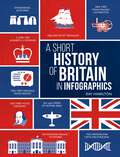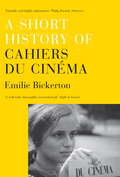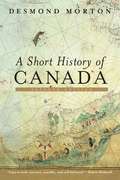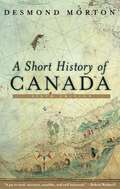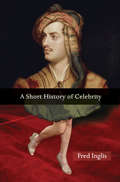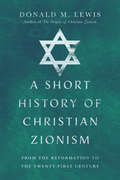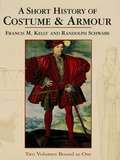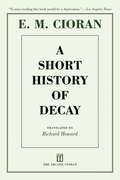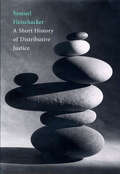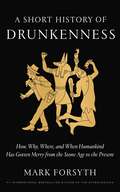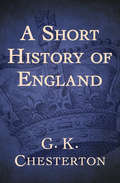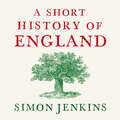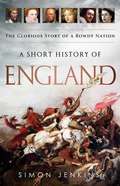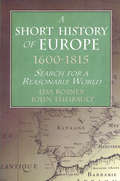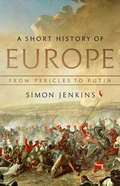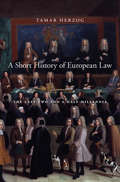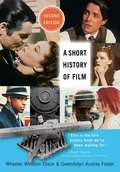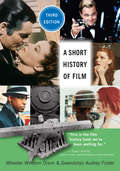- Table View
- List View
A Short History of Britain in Infographics
by Ray HamiltonDiscover the stomach-churning scope of Henry VIII’s voluminous diet, learn about the intricate anatomy of a Spitfire and improve your understanding of the mind-boggling phenomenon that is the British weather. These and many more fascinating facts are presented in this beautifully designed infographic guide to the best bits of Blighty!
A Short History of Britain in Infographics
by Ray HamiltonDiscover the stomach-churning scope of Henry VIII’s voluminous diet, learn about the intricate anatomy of a Spitfire and improve your understanding of the mind-boggling phenomenon that is the British weather. These and many more fascinating facts are presented in this beautifully designed infographic guide to the best bits of Blighty!
A Short History of British Architecture: From Stonehenge to the Shard
by Simon Jenkins'Provocative, elegant, intriguing - Jenkins is a bold, imaginative writer, brilliant at challenging old assumptions and encouraging you to look at British architecture in a new light' Rory StewartThe story of Britain is revealed through its buildings, and yet the language of architecture is a mystery to all but a few. In this enlightening history, spanning castles and cathedrals to factories and railway stations, Jenkins translates the hidden narratives infused in the facades we walk past every day.Britain’s history has been formed by its politics, religion and society and these influences can be seen in the architectural styles that have shaped its landscape. From pre-Roman and the Middle Ages, to the Renaissance and the Industrial Revolution, Classical and Gothic styles surged and retreated from favour only to then be challenged by a new player: Modernism, a style that reflected the stunning technological advances of the second half of the twentieth century.In this narrative history, Simon Jenkins – the bestselling champion of our national heritage – introduces us to the singular, eccentric and sometimes rather ordinary characters who shaped Britain. Jenkins teaches readers to see the world anew, demystifying the elitist language of architecture so that we can all appreciate the buildings around us.
A Short History of British Colonial Policy (Routledge Revivals)
by Hugh Edward EgertonThis volume discusses a short history of British Colonial policy. With all its faults the book represents much reading and some thought. In writing what is, to some extent, a history of opinion, it has been impossible altogether to suppress my own individual opinions. I trust, however that I have not seemed to attach importance to them. In dealing with the later periods, I remembered Sir Walter Raleigh's remark on the fate which awaits the treatment of contemporary history; but obscurity may claim its compensations, and atleast I am not conscious of having written under the bias of personal or party prejudice.
A Short History of British Psychology 1840-1940 (Psychology Library Editions: History of Psychology)
by L.S. HearnshawOriginally published in 1964, the story of the development of psychology in Great Britain had never been told. In the 1840s, when John Stuart Mill wrote about ‘Psychology’ in his treatise on Logic, the word was hardly known to the British public. Today the subject is taught in nearly every university, and psychologists are professionally employed by many public bodies. The British contribution to the dramatic rise of psychology was an exceptionally important one, and had been shamefully neglected not only by the public but by British psychologists themselves. The tendency at the time to regard the subject through American spectacles distorted the role of British pioneers. Significant British contributions had been almost completely forgotten – those of Carpenter, Lewes, Spalding and Lubbock for example – and the work of men such as Hughlings Jackson and Romanes had been greatly undervalued. Not the least important feature of the book is its reassessment of the work of many individuals. In relating the rise of psychology and its application to concomitant developments in medicine, physiology, biology, sociology, anthropology and statistics and to changes in the prevailing philosophic climate, the author shows psychology to be an integral part of the scientific, intellectual and social history of the past century.
A Short History of Cahiers du Cinema
by Emilie BickertonCahiers du Cinéma was the single most influential project in the history of film. Founded in 1951, it was responsible for establishing film as the 'seventh art,' equal to literature, painting or music, and it revolutionized film-making and writing. Its contributors would put their words into action: the likes of Godard, Truffaut, Rivette, Rohmer were to become some of the greatest directors of the age, their films part of the internationally celebrated nouvelle vague.In this authoritative new history, Emilie Bickerton explores the evolution and impact of Cahiers du Cinéma, from its early years, to its late-sixties radicalization, its internationalization, and its response to the television age of the seventies and eighties. Showing how the story of Cahiers continues to resonate with critics, practitioners and the film-going public, A Short History of Cahiers du Cinéma is a testimony to the extraordinary legacy and archive these 'collected pages of a notebook' have provided for the world of cinema.From the Hardcover edition.
A Short History of Canada: Seventh Edition
by Desmond MortonMost of us know bits and pieces of our history but would like to be more sure of how it all fits together. The trick is to find a history that is so absorbing you will want to read it from beginning to end. With this book, Desmond Morton, one of Canada’s most noted and highly respected historians, shows how the choices we can make at the dawn of the 21st century have been shaped by history.Morton is keenly aware of the links connecting our present, our past, and our future, and in one compact and engrossing volume he pulls off the remarkable feat of bringing it all together – from the First Nations before the arrival of the Europeans to the failure of the Charlottetown accord and Jean Chretien’s third term as prime minister. His acute observations on the Diefenbaker era, the effects of the post-war influx of immigrants, the flag debate, the baby boom, the Trudeau years and the constitutional crisis, the Quebec referendum, and the rise of the Canadian Alliance all provide an invaluable background to understanding the way Canada works today.
A Short History of Canada: Sixth Edition
by Desmond MortonMost of us know bits and pieces of our history but would like to be more sure of how it all fits together. The trick is to find a history that is so absorbing you will want to read it from beginning to end. With this book, Desmond Morton, one of Canada's most noted and highly respected historians, shows how the choices we can make at the dawn of the 21st century have been shaped by history.Morton is keenly aware of the links connecting our present, our past, and our future, and in one compact and engrossing volume he pulls off the remarkable feat of bringing it all together - from the First Nations before the arrival of the Europeans to the failure of the Charlottetown accord and Jean Chretien's third term as prime minister. His acute observations on the Diefenbaker era, the effects of the post-war influx of immigrants, the flag debate, the baby boom, the Trudeau years and the constitutional crisis, the Quebec referendum, and the rise of the Canadian Alliance all provide an invaluable background to understanding the way Canada works today.From the Trade Paperback edition.
A Short History of Celebrity
by Fred InglisLove it or hate it, celebrity is one of the dominant features of modern life--and one of the least understood. Fred Inglis sets out to correct this problem in this entertaining and enlightening social history of modern celebrity, from eighteenth-century London to today's Hollywood. Vividly written and brimming with fascinating stories of figures whose lives mark important moments in the history of celebrity, this book explains how fame has changed over the past two-and-a-half centuries. Starting with the first modern celebrities in mid-eighteenth-century London, including Samuel Johnson and the Prince Regent, the book traces the changing nature of celebrity and celebrities through the age of the Romantic hero, the European fin de siecle, and the Gilded Age in New York and Chicago. In the twentieth century, the book covers the Jazz Age, the rise of political celebrities such as Mussolini, Hitler, and Stalin, and the democratization of celebrity in the postwar decades, as actors, rock stars, and sports heroes became the leading celebrities. Arguing that celebrity is a mirror reflecting some of the worst as well as some of the best aspects of modern history itself, Inglis considers how the lives of the rich and famous provide not only entertainment but also social cohesion and, like morality plays, examples of what--and what not--to do. This book will interest anyone who is curious about the history that lies behind one of the great preoccupations of our lives.
A Short History of Celebrity
by Fred InglisLove it or hate it, celebrity is one of the dominant features of modern life--and one of the least understood. Fred Inglis sets out to correct this problem in this entertaining and enlightening social history of modern celebrity, from eighteenth-century London to today's Hollywood. Vividly written and brimming with fascinating stories of figures whose lives mark important moments in the history of celebrity, this book explains how fame has changed over the past two-and-a-half centuries. Starting with the first modern celebrities in mid-eighteenth-century London, including Samuel Johnson and the Prince Regent, the book traces the changing nature of celebrity and celebrities through the age of the Romantic hero, the European fin de siècle, and the Gilded Age in New York and Chicago. In the twentieth century, the book covers the Jazz Age, the rise of political celebrities such as Mussolini, Hitler, and Stalin, and the democratization of celebrity in the postwar decades, as actors, rock stars, and sports heroes became the leading celebrities. Arguing that celebrity is a mirror reflecting some of the worst as well as some of the best aspects of modern history itself, Inglis considers how the lives of the rich and famous provide not only entertainment but also social cohesion and, like morality plays, examples of what--and what not--to do. This book will interest anyone who is curious about the history that lies behind one of the great preoccupations of our lives.Some images inside the book are unavailable due to digital copyright restrictions.
A Short History of Christian Zionism: From the Reformation to the Twenty-First Century
by Donald M. LewisThis book is about an idea—namely, that Scripture mandates a Jewish return to the historical region of Palestine—which in turn morphed into a political movement, rallied around a popular slogan ("A country without a nation for a nation without a country"), and eventually contributed to the establishment of the state of Israel in 1948. Christian Zionism continues to influence global politics, especially U.S. foreign policy, and has deeply affected Jewish–Christian and Muslim–Christian relations. Donald M. Lewis seeks to provide a fair-minded, longitudinal study of this dynamic yet controversial movement as he traces its lineage from biblical sources through the Reformation to various movements of today. He explores Christian Zionism's interaction with other movements, forces, and discourses, especially in eschatological and political thought, and why it is now flourishing beyond the English-speaking world. Throughout he demonstrates how it has helped British and American Protestants frame and shape their identity. A Short History of Christian Zionism seeks to bring clarity and context to often-heated discussions.
A Short History of Costume & Armour
by Francis M. Kelly Randolph SchwabeThis magnificent fashion history is a stylistic panorama that ranges from the Norman conquest to the early 19th century, focusing chiefly on armor, from the Crusades to the 17th century; clothing of the English upper classes, both sexes, 11th to 19th centuries; and accessories, including gloves, belts, corsets, shoes, and headgear. 342 black-and-white illustrations.
A Short History of Decay
by E. M. Cioran Eugene ThackerE. M. Cioran confronts the place of today's world in the context of human history-focusing on such major issues of the twentieth century as human progress, fanaticism, and science-in this nihilistic and witty collection of aphoristic essays concerning the nature of civilization in mid-twentieth-century Europe. Touching upon Man's need to worship, the feebleness of God, the downfall of the Ancient Greeks and the melancholy baseness of all existence, Cioran's pieces are pessimistic in the extreme, but also display a beautiful certainty that renders them delicate, vivid, and memorable. Illuminating and brutally honest, A Short History of Decay dissects Man's decadence in a remarkable series of moving and beautiful pieces.
A Short History of Distributive Justice
by Samuel FleischackerDistributive justice in its modern sense calls on the state to guarantee that everyone is supplied with a certain level of material means. Samuel Fleischacker argues that guaranteeing aid to the poor is a modern idea, developed only in the last two centuries. Earlier notions of justice, including Aristotle's, were concerned with the distribution of political office, not of property. It was only in the eighteenth century, in the work of philosophers such as Adam Smith and Immanuel Kant, that justice began to be applied to the problem of poverty. To attribute a longer pedigree to distributive justice is to fail to distinguish between justice and charity. Fleischacker explains how confusing these principles has created misconceptions about the historical development of the welfare state. Socialists, for instance, often claim that modern economics obliterated ancient ideals of equality and social justice. Free-market promoters agree but applaud the apparent triumph of skepticism and social-scientific rigor. Both interpretations overlook the gradual changes in thinking that yielded our current assumption that justice calls for everyone, if possible, to be lifted out of poverty. By examining major writings in ancient, medieval, and modern political philosophy, Fleischacker shows how we arrived at the contemporary meaning of distributive justice.
A Short History of Drunkenness: How, Why, Where, and When Humankind Has Gotten Merry from the Stone Age to the Present
by Mark ForsythFrom the internationally bestselling author of The Etymologicon, a lively and fascinating exploration of how, throughout history, each civilization has found a way to celebrate, or to control, the eternal human drive to get sloshedAlmost every culture on earth has drink, and where there's drink there's drunkenness. But in every age and in every place drunkenness is a little bit different. It can be religious, it can be sexual, it can be the duty of kings or the relief of peasants. It can be an offering to the ancestors, or a way of marking the end of a day's work. It can send you to sleep, or send you into battle. Making stops all over the world, A Short History of Drunkenness traces humankind's love affair with booze from our primate ancestors through to the 20th century, answering every possible question along the way: What did people drink? How much? Who did the drinking? Of the many possible reasons, why? On the way, learn about the Neolithic Shamans, who drank to communicate with the spirit world (no pun intended), marvel at how Greeks got giddy and Sumerians got sauced, and find out how bars in the Wild West were never quite like in the movies. This is a history of the world at its inebriated best.
A Short History of Economic Progress: A Course In Economic History
by Y.S. BrennorY. S. Brenner is an economist whose main concern is with development, and this attitude is reflected in his approach to economic history.He begins this seminal study in the era of the Reformation in Europe, and bases it on the hypothesis that once started, economic progress will spread over ever-increasing parts of the earth wherever and whenever conditions become suitable. From this point of view, he examines the nature of the impediments which prevent the more rapid and general progress of mankind towards greater material affluence, while at the same time considering the positive growth promoting factors in the various economies. Thus, he provides an analysis of economic progress in the developed countries showing which natural, social, political and cultural forces promoted such progress and which delayed or hindered it. He attempts to explain why European nations took several decades to emulate the achievements of Britain and why nations in other parts of the world, such as Japan and Russia, were unable for a considerable time to match the advances made in parts of Western Europe and the United States. Finally, he attempts to explain why the developing countries are still finding it so difficult to catch up with the economic progress of the more advanced nations.Y. S. Brenner was Head of the Department of Economics at Cape Coast University in Ghana. The book arose from a series of lectures on economic development he delivered there during the years 1966-1967. This book was first published in 1969.
A Short History of England
by G. K. ChestertonA unique and accessible history of England from one of the country's preeminent thinkers Published in 1917, A Short History of England is a "popular book of history" told through the layman's eyes. G. K. Chesterton takes the reader on brisk, casual strolls through the annals of Anglo-Saxon history by discussing key topics and periods, including "The Defeat of the Barbarians," "The Problem of the Plantagenets," and "Nationality and the French Wars," in clear and insightful prose. A fascinating collection of short pieces that bring the past to stimulating life, A Short History of England is a testament to the unique qualities that, according to George Bernard Shaw, made Chesterton "at once the most concise and the fullest historian this distressful country has yet found." This ebook has been professionally proofread to ensure accuracy and readability on all devices.
A Short History of England
by Simon JenkinsFrom the invaders of the dark ages to the aftermath of the coalition, one of Britain's most respected journalists, Simon Jenkins, weaves together a strong narrative with all the most important and interesting dates in a book that characteristically is as stylish as it is authoritative.A Short History of England sheds light on all the key individuals and events, bringing them together in an enlightening and engaging account of the country's birth, rise to global prominence and then partial eclipse.There have been long synoptic histories of England but until now there has been no standard short work covering all significant events, themes and individuals.Now updated to take in the rapid progress of recent events and beautifully illustrated, this magisterial history will be the standard work for years to come.
A Short History of England: The Glorious Story of a Rowdy Nation
by Simon JenkinsThe heroes and villains, triumphs and disasters of English history are instantly familiarOCo-from the Norman Conquest to Henry VIII, Queen Victoria to the two world wars. But to understand their full sig nificance we need to know the whole story. a "A Short History of England "sheds new light on all the key individuals and events in English histo ry by bringing them together in an enlightening account of the countryOCOs birth, rise to global promi nence, and then partial eclipse. Written with flair and authority by "Guardian" columnist and "London" "Times "former editor Simon Jenkins, this is the definitive narrative of how todayOCOs England came to be. Concise but comprehensive, with more than a hundred color illustrations, this beautiful single-volume history will be the standard work for years to come. a
A Short History of Europe, 1600-1815: Search for a Reasonable World
by Lisa Rosner John TheibaultA concise survey that introduces readers to the people, ideas, and conflicts in European history from the Thirty Years' War to the Napoleonic Era. The authors draw on gender studies, environmental history, anthropology and cultural history to frame the essential argument of the work.
A Short History of Europe: From Pericles to Putin
by Simon JenkinsA sweeping, illustrated history of Europe--a continent whose imperial ambitions, internal clashes, and existential threats are as vital today as they were during the conquests of Alexander the Great In just a few hundred years, a modest peninsula off the northwest corner of Asia has seen the rise and fall of several empires; served as the crucible for scientific dynamism, cultural innovation, and economic revolution; and witnessed cataclysms and bloodshed that have almost destroyed it several times over. This is Europe: a continent whose identity emerged not so much by virtue of geographic or ethnic continuity, but by a long and storied struggle for power.Studded with infamous figures--from Caesar to Charlemagne and Machiavelli to Marx--Simon Jenkins's history of Europe travels briskly from the Roman Empire, the Dark Ages, and the Reformation through the French Revolution, the World Wars, and the fall of the USSR. What emerges in this thrilling and expansive telling is a continent as defined by its continually clashing cultural identities and violent crises as it is by its tireless drive for a society based on the consent of the governed--which holds true right up to the present day.
A Short History of European Law: The Last Two and a Half Millennia
by Tamar HerzogTamar Herzog offers a road map to European law across 2,500 years that reveals underlying patterns and unexpected connections. By showing what European law was, where its iterations were found, who made and implemented it, and what the results were, she ties legal norms to their historical circumstances and reveals the law’s fragile malleability.
A Short History of Film
by Wheeler Dixon Gwendolyn FosterA Short History of Film, Second Edition, provides a concise and accurate overview of the history of world cinema, detailing the major movements, directors, studios, and genres from 1896 through 2012. The new edition is unmatched in its panoramic view, conveying a sense of cinema's sweep in the twentieth and early twenty-first centuries as it is practiced in the United States and around the world.
A Short History of Film, Third Edition
by Wheeler Winston Dixon Gwendolyn Audrey FosterWith more than 250 images, new information on international cinema—especially Polish, Chinese, Russian, Canadian, and Iranian filmmakers—an expanded section on African-American filmmakers, updated discussions of new works by major American directors, and a new section on the rise of comic book movies and computer generated special effects, this is the most up to date resource for film history courses in the twenty-first century.
A Short History of Financial Euphoria
by John Kenneth GalbraithIn this book, its brevity compelling attention, the eminent economist chronicles the histories of several speculative periods of the last three centuries, discussing their sad aftermaths and analyzing the peculiar pitfalls of get-rich-quick schemes.
